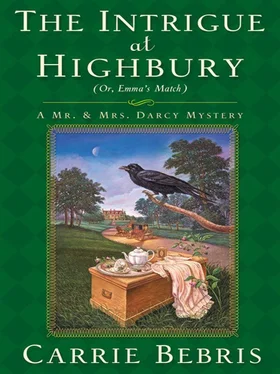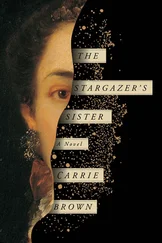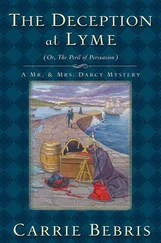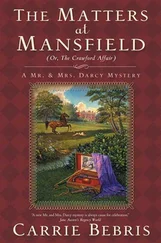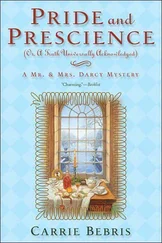“Could more be determined by examining Edgar Churchill’s remains?” Mr. Knightley asked.
“I doubt it, but I can make an attempt. I need to retrieve some instruments from my office, however.”
Mr. Perry departed, leaving the Knightleys with the uncomfortable business of breaking the news to their guests.
“We should return to the drawing room,” Emma stated, “and attempt to control what is said of this matter — if word has not somehow reached everybody’s ears already. Doubtless, the servants are talking amongst themselves, and Frank Churchill’s disclosure to Jane might have been overheard.”
“Frank Churchill is a man capable of great secrecy when it suits him.”
“Do you intend to ask him about his uncle’s general health?”
Her husband was silent for a minute. “I have several questions for Frank Churchill.”
Emma did not like his tone. “Surely you do not believe Edgar Churchill’s death to be anything but a most unfortunate accident?”
“As Frank Churchill himself stated only minutes ago, his uncle’s death results in his inheriting a handsome estate just as he is taking a wife and starting a family of his own. I would not be a very competent magistrate if I failed to notice the coincidence.”
“Frank Churchill is as shocked by this event as we are.”
“Not too shocked to immediately realize the benefit of it to himself.”
Of course he had realized it — Frank was only human, after all. She herself had even thought almost immediately of the likely gossip and its effect on her own reputation in the village. It was not a reaction of which she was proud, but it was natural.
“You are unjust. From the moment Frank first came to Highbury — nay, before he even visited the village — you did not like him. All Highbury adored him, yet you privately expressed to me criticism of his character that I daresay you continue to harbor. You believed him derelict in his duty toward his father whilst he served the will of his rich aunt and uncle, the very people towards whom you now accuse him of not feeling enough. Could not your prejudice against him be causing your distrust?”
“I neither accuse nor suspect Frank Churchill of anything at present. But even did I not have a responsibility as magistrate, a guest has died in our house, and until the cause is clear, I cannot be easy. Nor, I should think, could you, given that this event will doubtless be the talk of the village for months.”
“Highbury will not think ill of Frank, and neither should you. Now, come assist me in disbanding this party and mitigating the inevitable gossip.”
“I am afraid no one can leave Donwell quite yet. One of our guests might have observed something regarding Mr. Churchill that we did not, and I want to speak with each person while his memory is untarnished.”
Emma regarded him in horror. “You are not going to conclude Frank and Jane’s marriage fête by interrogating all their friends and family?”
“I will merely ask a few questions of each guest, in as discreet a manner as possible — a brief but personal conversation. I shall give the appearance of breaking the news of Edgar Churchill’s death gently and individually.”
Emma inwardly cringed. Mr. Knightley’s straightforward manner — which she considered one of his most admirable qualities — would doubtless defeat all his intentions of delicacy.
“Will you allow me to assist you?”
“You can aid me best by keeping everyone calm and diverted while I conduct the tête-à-têtes.”
“Then perhaps one of the other parish officials? There are so many guests that it will take you all night to question them.”
“Whom else can I trust to handle this properly? Mr. Elton? His vanity would turn the process into a witch hunt. Mr. Weston? As much as I esteem him and his friendship, and value his help in other matters, under these circumstances he is entirely the wrong person to further involve in the affair. Not only does his connexion to the Churchills render him biased, but he is of too social a disposition. He would take every person he interviewed into our trust, and there would be the end of any confidentiality.”
Though Emma loved the avuncular Mr. Weston, she had to concede Mr. Knightley’s assessment of his fitness for this particular duty. The man possessed such an open, honest character that he was constitutionally incapable of keeping a secret.
“What about Mr. Cole or Mr. Cox?” she suggested.
“They have no experience with investigations, and their connexion to the Churchills is slight; their involvement at this stage would appear odd enough to inspire the very speculation and gossip we hope to discourage. The one person I might depend upon is Mr. Perry. Though he serves as our coroner, his interest would most likely be seen as medically, not legally, motivated. But his time at present is better spent examining Mr. Churchill’s remains, and I want to conduct the interviews and disperse immaterial witnesses as quickly as possible. No, I am afraid I must do this myself.”
As there was no dissuading him, Emma returned to the drawing room to divert her guests’ attention from a process which, despite Mr. Knightley’s characterizing it as a series of “personal conversations,” had to her all the hallmarks of an inquisition.
Fortunately, Edgar Churchill had interacted with only his most intimate acquaintances whilst in the drawing room, and Frank, though he had flitted from group to group, had in his usual style said little of consequence, so most of the guests had observed nothing of import and were released fairly quickly. They all might see their beds before the hour grew unconscionably late. Emma was particularly eager to send her father home, as word of anyone’s death was sure to upset him. The Westons took the news of Edgar Churchill’s demise particularly hard, and Miss Bates’s exclamations, though heartfelt, were enough to inspire a hasty retreat by every member of the company even had propriety not.
Despite her warm defense of Frank, Emma could not dismiss Mr. Knightley’s skepticism from her mind as she encouraged their overnight guests to retire to their individual chambers, and saw the rest depart. There would be no more merriment, let alone matchmaking, among this assembly. Guests originally expected to stay a se’nnight were already forming plans to leave on the morrow. So much for her hopes regarding Miss Bates. The only person’s prospects that had improved this evening were Frank’s.
Yes, it was most inconsiderate of Edgar Churchill to die during his nephew’s marriage celebration.
But for his nephew, it was also most convenient.
Volume the Second
in which Mr. and Mrs. Darcy become acquainted
with Mr. and Mrs. Knightley… and
all of Highbury
“There are secrets in all families, you know.”
—
Mr. Weston ,
Emma
“The sooner every party breaks up, the better.”
— Mr. Woodhouse ,
Emma
Donwell Abbey was an impressive residence, its entire façade alight against the surrounding darkness. Like a number of England’s great houses, Donwell had once been home to a religious order before King Henry the Eighth dissolved the monasteries, and its stone walls yet evinced dignity and grace. Though successive generations of private owners had influenced its current architecture, enough carved saints piously embellished its remaining pointed arches to recall the building’s hallowed origins.
It was appropriate that a former center of religious life should yet serve parish business — as the home of the magistrate — and on any other occasion Fitzwilliam Darcy would have welcomed the opportunity to become acquainted with the master of such a house. But the purpose of this visit was not pleasure, nor was Darcy in a social mood.
Читать дальше
